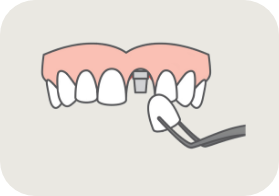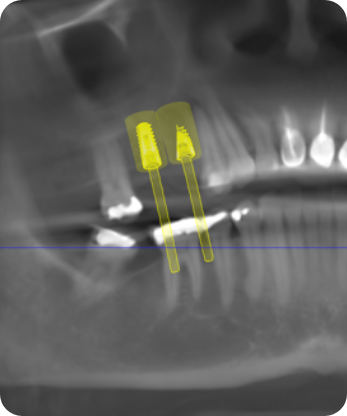Single Tooth Dental Implants
Home / Dental Implants / Single Tooth Dental Implants
Single Tooth Dental Implants
A single tooth implant is an ideal solution for individuals who are missing a single teeth. The replaced tooth replaces both the lost natural tooth and its root and will look and function like a natural tooth. You will help be able to regain confidence in your smile. Speak and smile again without worrying about your missing tooth.
An additional benefit to single a tooth implant is that it can help prevent bone loss. This can not be accomplished by wearing a conventional dental bridge. That is because the implant stimulates the bone, through regular chewing and biting, which helps to stave off deterioration of the jaw.


What are the advantages of a single-tooth implant over a bridge?
A single tooth implant is an ideal solution for individuals who are missing a single teeth. The replaced tooth replaces both the lost natural tooth and its root and will look and function like a natural tooth. You will help be able to regain confidence in your smile. Speak and smile again without worrying about your missing tooth.
An additional benefit to single a tooth implant is that it can help prevent bone loss. This can not be accomplished by wearing a conventional dental bridge. That is because the implant stimulates the bone, through regular chewing and biting, which helps to stave off deterioration of the jaw.
How Do Single Tooth Implants Work?
Single tooth implants act to replace the entire tooth structure, rather than just a crown or a visible portion of the tooth.
An entire dental implant restoration consists of three main parts:
- Dental implant. This is a titanium screw-like post that is surgically placed in your jawbone. A dental implant acts to replace a natural tooth root and serve as an anchor to the tooth crown.
- Crown. An implant-retained crown is a custom restoration that mimics the missing tooth in both function and aesthetics.
- Abutment. This is a tiny connector that attaches the crown to the dental implant. Abutments are crucial to ensure a stable foundation for your new tooth.


Single Tooth Dental Implants
A single tooth implant is an ideal solution for individuals who are missing a single teeth. The replaced tooth replaces both the lost natural tooth and its root and will look and function like a natural tooth. You will help be able to regain confidence in your smile. Speak and smile again without worrying about your missing tooth.
An additional benefit to single a tooth implant is that it can help prevent bone loss. This can not be accomplished by wearing a conventional dental bridge. That is because the implant stimulates the bone, through regular chewing and biting, which helps to stave off deterioration of the jaw.

What are the advantages of a single-tooth implant over a bridge?
A dental implant provides several advantages over other tooth replacement options. In addition to looking and functioning like a natural tooth, a dental implant replaces a single tooth without sacrificing the health of neighboring teeth. The other common treatment for the loss of a single tooth, a tooth-supported fixed bridge, requires that adjacent teeth be ground down to support the cemented bridge.
Because a dental implant will replace your tooth root, the bone is better preserved. With a bridge, some of the bone that previously surrounded the tooth begins to resorb (deteriorate). Dental implants integrate with your jawbone, helping to keep the bone healthy and intact.
In the long term, a single implant can be more esthetic and easier to keep clean than a bridge. Gums can recede around a bridge, leaving a visible defect when the metal base or collar of the bridge becomes exposed. Resorbed bone beneath the bridge can lead to an unattractive smile. And, the cement holding the bridge in place can wash out, allowing bacteria to decay the teeth that anchor the bridge.
How Do Single Tooth Implants Work?
Single tooth implants act to replace the entire tooth structure, rather than just a crown or a visible portion of the tooth.
An entire dental implant restoration consists of three main parts:
- Dental implant. This is a titanium screw-like post that is surgically placed in your jawbone. A dental implant acts to replace a natural tooth root and serve as an anchor to the tooth crown.
- Crown. An implant-retained crown is a custom restoration that mimics the missing tooth in both function and aesthetics.
- Abutment. This is a tiny connector that attaches the crown to the dental implant. Abutments are crucial to ensure a stable foundation for your new tooth.

Our Dental Implant Process
WHAT IS THE PROCESS OF OUR DENTAL SOLUTION?
01
Consultation
& Planning
Before the procedure, Dr. Rattan will use advanced technology including CT scans, 3D facial scanners, intra-oral cameras to plan the ideal treatment for patients. Dr. Rattan will also discuss your medical history, current medications, and any current health problems to determine if you are an ideal candidate for oral surgery.
02
Treatment
Plan
Dr. Rattan will present you with your treatment plan and discuss financing options. If you decide to proceed with treatment, your implant placement procedure will be scheduled for a later date. In some cases, a pre-op appointment may also be scheduled to discuss dental sedation, how to prepare, and to go over any prescriptions needed.
03
Surgery &
Placement
The day of your appointment, Dr. Rattan will begin with extraction of any remaining teeth and perform surgical treatment for the placement of dental implants. Four dental implants will be placed in the upper arch and an additional four implants will be placed in the lower arch. These implants will be used to support a temporary denture while the
implant sites heal.
04
Recovery &
Final Restoration
The recovery time is approximately three months. Our caring dentists will explain to you everything about oral care during your recovery period. In the final step, the temporary acrylic teeth are replaced with permanent teeth that are made of sturdy materials.
Frequently Asked Questions
Most dental implants are made of titanium, a biocompatible material which promotes the growth of bone tissue (a process called “osseointegration”). Patients with metal allergies or sensitivities may benefit from ceramic or zirconia dental implants.
Strictly speaking, implants can't be rejected because they contain no living cells or genetically coded material. The titanium of which they are made is completely biocompatible, and allergies are extremely rare. But an implant can fail to integrate with the jawbone if an infection develops in the absence of good oral hygiene, or if it is subjected to biting forces too soon. However, this is rare; implants regularly achieve success rates in excess of 95%.
They require exactly the same care as natural teeth: daily brushing and flossing, along with regular dental checkups and professional cleanings. Although implant teeth will never decay, the gum tissues around them can become inflamed or infected in the absence of good oral hygiene. Properly cared-for dental implants should last a lifetime.

- 2955 Corral Hollow Rd #100, Tracy, CA 95376, United States
- office@innovodentalstudio.com
Get Started
- Monday | 10 AM - 7 PM
- Tuesday | 9 AM - 6 PM
- Wednesday | 10 AM - 7 PM
- Thursday | 9 AM - 6 PM
- Thursday | 9 AM - 6 PM
- Friday | 10 AM - 7 PM

